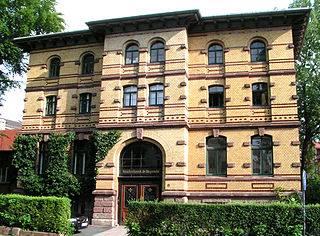Related Research Articles

Vandenhoeck & Ruprecht (V&R) is a scholarly publishing house based in Göttingen, Germany. It was founded in 1735 by Abraham Vandenhoeck (1700-1750) in connection with the establishment of the Georg-August-Universität in the same city.

The Göttingen Academy of Sciences is the second oldest of the seven academies of sciences in Germany. It has the task of promoting research under its own auspices and in collaboration with academics in and outside Germany. It has its seat in the university town of Göttingen.
Volker Rolf Berghahn is a historian of German and modern European history at Columbia University. His research interests have included the fin de siècle period in Europe, the origins of World War I, and German-American relations. He received his M.A. from the University of North Carolina at Chapel Hill in 1961 and his Ph.D., under supervision of Francis L. Carsten, from the University of London in 1964. Prior to teaching in the United States, Berghahn worked in the United Kingdom and Germany. In 1988, he accepted a position at Brown University, and moved to Columbia ten years later.

Michael Bordt SJ is a German philosopher and academic. He is a professor at the Munich School of Philosophy and specialized in the area of ancient philosophy, especially Plato and Aristotle. Since 2011 he has been the chair of the Institute of Philosophy and Leadership at Munich.

Gerrit Bol was a Dutch mathematician, who specialized in geometry. He is known for introducing Bol loops in 1937, and Bol’s conjecture on sextactic points.

Evangelisches Gesangbuch is the current hymnal of German-language congregations in Germany, Alsace and Lorraine, Austria, and Luxembourg, which was introduced from 1993 and 1996, succeeding the Evangelisches Kirchengesangbuch (EKG). Evangelisches Gesangbuch appears in 14 different regional editions, which add regional hymns to the 535 hymns common for all editions.
Ilko-Sascha Kowalczuk is a German historian and author. His work is focused on the German Democratic Republic and its Ministry for State Security.
Mike Schmeitzner is a German historian. His focus is on twentieth century German history.
Friedrich Wilhelm Karl, Ritter von Hegel was a German historian and son of the philosopher Georg Wilhelm Friedrich Hegel. During his lifetime he was a well-known and well-reputed historian who received many awards and honours, because he was one of the major urban historians during the second half of the 19th century.

Rebekka Habermas is a German historian, professor of modern history at the University of Göttingen, in Germany. Habermas has made substantial contributions to German social and cultural history of the 19th century.

Benjamin Ziemann is a German historian who lectures at the University of Sheffield. Since 2011, he has been Professor of Modern German History at the Department of History, University of Sheffield.

Simone Lässig is the director of the German Historical Institute Washington DC and a cultural and social historian of the nineteenth and twentieth centuries.

Christian Hartmann is a German historian. He is a research fellow at the Institute of Contemporary History in Munich.

Norbert Finzsch as Norbert Rollewitz is a German historian.
The Göttingen Faculty of Theology is the divinity school at the University of Göttingen, officially denominated the "United Theological Departments" but commonly referred to as the "Theological Faculty" . It was instituted at the foundation of the University, in 1737, along with the three other original faculties of Law, Medicine, and Philosophy. Over the centuries, the Göttingen Faculty of Theology has been home to many influential scholars and movements, including the rise of historical criticism, Ritschlianism, the History of Religions School, and Dialectical Theology. Its members were also involved in the Göttingen School of History.

Johannes Paulmann is a German historian.
Rudolf Vierhaus was a German historian who mainly researched the Early modern period. He had been a professor at the newly founded Ruhr University Bochum since 1964. From 1971, he was director of the Max-Planck-Institut für Geschichte in Göttingen. He became known for his research on the Age of Enlightenment.
Sebastian Voigt is a German historian at the Institute for Contemporary History, Munich - Berlin, and a fellow at the Institute for Social Movements, Ruhr University Bochum, Germany. He specializes in the history of the trade union and the labor movement, Antisemitism, (anti)-communism and the history of the political-left.
Hans Medick is a German historian.
Peter G. J. Pulzer is a British historian of Austrian descent.
References
- ↑ Former Research Fellows. German Historical Institute London. Retrieved 12 November 2016.